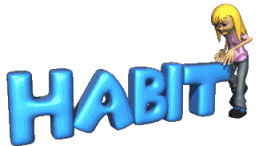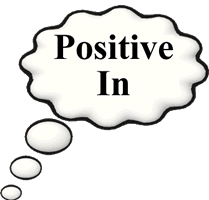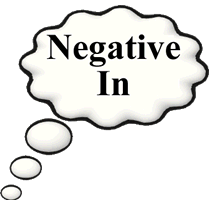Addressing Substance Abuse.
NOTE: anytime the word DRUG is mentioned on this page it includes all forms of substance abuse from prescription tablets & alcohol to coffee & tea. If you are addicted to it then for you it a drug.
In today’s world there exists a knowledge explosion. But with this sudden increase in knowledge, many times wisdom is overlooked. Wisdom is knowledge combined with experience and application. The ultimate source of wisdom is The Almighty.
Substance Abuse has devastating consequences, including poverty and sorrow. Any family member or close associate of a substance abuser can admit to the heartaches and losses endured because of it. Think about it ... many times when mood-altering substances are used, they are a quick, although eventually ineffective, ‘fix’ to legitimate needs i.e. the pain in the heart.
Substance use has become another of the many things that is part of modern life. I am convinced that most people have very little idea of what real effects that drugs have on our body and brain. All drugs are toxic to our body; this applies to both prescribed and illicit drugs. They all have some type of negative effect on our body. When it comes to illicit drugs, as there is no regulatory control over manufacturing, they then can be quite harmful, as the ingredients and potency are irregular.
It takes courage and strength to face up to Substance Abuse. When you’re bogged down in drug abuse and drug addiction, freedom can seem like an impossible goal. But recovery is never out of reach, no matter how hopeless your current situation seems.
Change is possible with the right treatment and support, and by making lifestyle changes that address the root cause of your addiction. Don’t give up, even if you’ve tried and failed before. There are many different roads to recovery, but almost all involve bumps, pitfalls, and setbacks. By examining the problem and thinking about making the necessary changes, you’re already on your way.
For many people struggling with addiction, the biggest and toughest step toward recovery is the very first one: deciding to make a change. It’s normal to feel conflicted about giving up your drug of choice, even when you realize it’s causing problems in your life. Change is never easy—and committing to sobriety involves changing many things, including:
• The way you deal with stress. (see Challenge 12)
• Who you allow in your life
• What you do in your free time
• How you think about yourself
You may wonder if you’re really ready for all that change or if you have what it takes to quit. It’s okay if you’re torn. Recovering from addiction is a long process, one that requires time, commitment, motivation, and support. As you contemplate your situation, the following tips can help you make the decision.
Explore Your Treatment Options:
Once you’ve made the decision to challenge your Substance Abuse, it’s time to explore your treatment choices. As you consider the options, keep the following in mind:
There’s no magic bullet or single treatment that works for everyone. When considering a program, remember that everyone’s needs are different. Substance Abuse treatment should be customized to your unique problems and situation. It’s important that you find a program that feels right.
Your treatment should address more than just your Substance Abuse. Addiction affects your whole life, including relationships, career, health, and psychological well-being. Treatment success depends on developing a new way of living and addressing the reasons why you turned to drugs in the first place. It may have been because of an inability to manage stress, in which case you’ll need to find healthy ways to handle stressful situations.
Substance Abuse treatment is not a quick and easy process. In general, the longer and more intense the drug use, the longer and more intense the treatment you’ll need. But regardless of the treatment program’s length in weeks or months, long-term follow-up care is crucial to recovery.
Drugs trick our brain to make us feel better through developing endorphins in the brain that tell us we feel good. In actual fact drugs take, but do not give, although they can mask the pain in our heart or mind, for a short time, they take from our immune system, which in turn weakens our ability to be healthy.
Small pleasure for a short time, impacts our life financially. Because drugs give little and take much; the cost to us is enormous both financially and mentally. When dependence upon drugs affects a person or a household, the values change, so that essential elements for happy life and well being are replaced by the negative desire for this short term fix.
I emphasise drugs are only short term in nature; there is no long time advantage of drug use. Dependence on the use of drugs lowers the standards of life, so that friends change, positive balance in life diminishes until crime and degradation rule in the life of the individual.
There is an ache in the heart that needs to be relieved of pain, 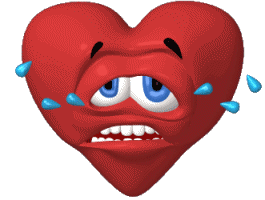 but drugs are only ever short term and very costly. When we are able to fill our mind with positive thoughts (Challenge1) and unload the grudges and hurts that cause the pain (Challenge 5) in our heart, we can be free to know peace and love in our heart. Drugs become like a demon that strips us of dignity and value and cause us to spiral downward into a totally negative lifestyle. but drugs are only ever short term and very costly. When we are able to fill our mind with positive thoughts (Challenge1) and unload the grudges and hurts that cause the pain (Challenge 5) in our heart, we can be free to know peace and love in our heart. Drugs become like a demon that strips us of dignity and value and cause us to spiral downward into a totally negative lifestyle.
To move away from this downward spiral takes some effort on your part. You will need to feed your mind with some positive thoughts and understand that you are in control of your life. With your choices you can make the difference. You have the power to resist the temptation of continuing in the negative drug dependence.
Thinking About Change:
• Keep track of your drug use, including when and how much you use. This will give you a better sense of the role the addiction is playing in your life.
• List the pros and cons of quitting, as well as the costs and benefits of continuing your drug abuse.
• Consider the things that are important to you, such as your partner, your kids, your career, or your health. How does your drug use affect those things?
• Talk it over with someone you trust. Ask the person how he or she feels about your drug use.
• Ask yourself if there’s anything preventing you from changing. What are some things that could help you make the change?
Sometimes it is hard to see that the pain of change is better than the pain of remaining the same as you are right now. The way you think is the way that you are and will be. So when you feed your brain with positive thinking to replace the negative thoughts, so that your whole life will benefit from the positiveness.
The friends that you have, affect your life; either negatively or positively. Anything that you allow to enter yourself whether that be through your eyes, ears, taste, touch and smell will have either a negative or positive influence on your life. So by changing what you allow into your being, you can choose to change to only allow positive and good to enter your life.
I know you are looking for some way to reduce the pain in your heart, but please remember that drugs take more than they give. So to remain in that type of life style is only a downhill trip in the long term.
You have the power of choice to make a positive change in your life. You don’t have to remain in the same way as it has been you can change. I guarantee the pain of that change will be less than the pain of remaining the same with no change.
As you are able to work through the negative influences in your life and fill your mind with positive thoughts, through the choices you make, you will find the answers to the pain in your heart. As a matter of fact when you start to dwell in the positive thought world, your whole life will become less painful and have much more meaning and fulfilment.
The choice is yours. Do you want to remain in a negative control or do you want to choose to bring positive thoughts into your life?
Preparing For Change:
6 Key Steps to Addiction Recovery.
1. Remind yourself of the reasons you want to change.
2. Remember the pain of the previous experiences caused by drugs.
3. Think about your past attempts at quitting, if any. What worked? What didn’t?
4. Set specific, measurable goals, such as a quit date or limits on your drug use.
5. Remove reminders of your addiction from your home and workplace.
6. Tell friends and family that you’re quitting and ask for their support.
Commitment and follow-through is the key. Drug addiction treatment is not a quick and easy process. In general, the longer and more intense the drug use, the longer and more intense the treatment you’ll need. But regardless of the treatment program’s length in weeks or months, long-term follow-up care is crucial to recovery.
There are many places to turn for help.  Not everybody requires medically supervised detox or an extended stint in rehab. The level of care you need depends on your age, drug use history, and other medical or psychiatric conditions. In addition to doctors and psychologists, many clergy members, social workers, and counsellors offer addiction treatment services. Not everybody requires medically supervised detox or an extended stint in rehab. The level of care you need depends on your age, drug use history, and other medical or psychiatric conditions. In addition to doctors and psychologists, many clergy members, social workers, and counsellors offer addiction treatment services.
Don’t try to go it alone. Whatever treatment approach you choose, having a solid support system is essential. The more positive influences you have in your life, the better your chances for recovery. Recovering from drug addiction isn’t easy, but with people you can turn to for encouragement, guidance, and a listening ear, it’s a little less tough.
Lean on close friends and family – Having the support of friends and family members is an invaluable asset in recovery. If you’re reluctant to turn to your loved ones because you’ve let them down before, consider going to couples counselling or family therapy.
Build an abuse free social network – If your previous social life revolved around drugs, you may need to make some new connections. It’s important to have abuse free friends who will support your recovery. Try taking a class, joining a church or a civic group, volunteering, or attending events in your community.
Consider moving in to an abuse free living home that provide a safe, supportive place to live while you’re recovering from drug addiction. They are a good option if you don’t have a stable home or a drug-free living environment to go to.
Make meetings a priority – Join a recovery support group and attend meetings regularly. Spending time with people who understand exactly what you’re going through can be very healing. You can also benefit from the shared experiences of the group members and learn what others have done to stay sober. Most towns have NA, AA, or support groups.
Relieving Stress without Drugs.
(also see Challenge 12)
Drug abuse often stems from misguided attempts to manage stress. Many people turn to alcohol or recreational drugs to unwind and relax after a stressful day, or to cover up painful memories and emotions that cause us to feel stressed and out of balance. But there are healthier ways to keep your stress level in check, including exercising, meditating, using sensory strategies to relax, practicing simple breathing exercises, and challenging self-defeating thoughts.
Drug addiction treatment and recovery keep triggers and cravings in check.
While getting sober from drugs is an important first step, it’s only the beginning of the recovery process. Once sober, the brain needs time to recover and rebuild connections that have changed while addicted. During this time, drug cravings can be intense. You can support your continued sobriety by making a conscious effort to avoid people, places, and situations that trigger the urge to use:
Make a break from old drug buddies. Don’t make the mistake of hanging out with old friends who are still doing drugs. Surround yourself with people who support your sobriety, not those who tempt you to slip back into old, destructive habits.
Avoid bars and clubs, even if you don’t have a problem with alcohol. Drinking lowers inhibitions and impairs judgment, which can easily lead to relapse. Drugs are often readily available and the temptation to use can be overpowering. Also avoid any other environments and situations that you associate with drug use.
Be up front about your history of drug use when seeking medical treatment. If you need a medical or dental procedure done, be up front about your history and find a provider who will work with you in either prescribing alternatives or the absolute minimum medication necessary. You should never feel ashamed or humiliated about previous drug use or be denied medication for pain; if that happens, find another provider.
Use caution with prescription drugs. Stay away from prescription drugs with the potential for abuse or use only when necessary and with extreme caution. Drugs with a high abuse potential include painkillers, sleeping pills, and anti-anxiety medication.
Coping With Drug Cravings.
Sometimes craving cannot be avoided, and it is necessary to find a way to cope:
You can support your drug treatment and protect yourself from relapse by having activities and interests that provide meaning to your life. It’s important to be involved in things that you enjoy and make you feel needed. When your life is filled with rewarding activities and a sense of purpose, your addiction will lose its appeal.
Get involved in some distracting activity such as reading, a hobby (jigsaws, drawing, some form of crafts), going to a movie, exercising (jogging, gyms, biking, bush walking) are all good examples of distracting activities. Once you get interested in something else, you’ll find this will help the urges go away. Another effective response to a drug craving is eating (being careful what you eat, as eating junk will only add stress and inches to your waistline).
Do things that challenge your creativity and spark your imagination —something you’ve always wanted to try.
Get a pet. Yes, pets are a responsibility, but caring for an animal makes you feel loved and needed. Pets can also get you out of the house for exercise.
Replace your addiction with drug-free groups and activities. Volunteer, become active in your church or faith community, or join a local club or neighbourhood group.
Talk it through with friends or family members about craving when it occurs. Talking about cravings and urges can be very helpful in pinpointing the source of the craving. Also, talking about craving often helps to discharge and relieve the feeling and will help restore honesty in your relationship. Craving is nothing to feel bad about.
Many people try to cope with their urges by gritting their teeth and toughing it out. But some are just too strong to ignore. When this happens, it can be useful to stay with the urge until it passes. This technique is called urge surfing. Imagine yourself as a surfer who will ride the wave of your drug craving, staying on top of it until it crests, breaks, then turns into less powerful, foamy surf.
When experiencing a craving, many people have a tendency to remember only the positive effects of the drug and forget the negative consequences. Therefore, you may find it helpful to remind yourself that you really won’t feel better if you use and that you stand to lose a lot. Sometimes it is helpful to have these benefits and consequences listed on a small card that you keep with you.
(Adapted from: The National Institute on Alcohol Abuse and Alcoholism booklet.)
What Causes Relapse?
Various ‘triggers’ can put people at risk of relapsing into old patterns of substance use. Causes of relapse can differ for each person. Some common ones include:
• negative emotional states (such as anger, sadness, trauma or stress)
• physical discomfort (like withdrawal symptoms or physical pain)
• positive emotional states (wanting to feel even better)
• testing personal control (“I can have just one drink/cone/ joint/shot”)
• strong temptations or urges (cravings to use again)
• conflict with others (such as an argument with a spouse/ partner/mate/boss/parent)
• social pressures to use (situations where it seems as though everyone else is drinking or using other drugs)
• good times with others (such as having fun with friends or family)
The important thing to remember is that relapse doesn’t mean treatment failure. Rather than giving up, get back on the wagon as quickly as you can. Call your sponsor, talk to your therapist, go to a meeting, or schedule an appointment with your doctor. When you’re sober again and out of danger, look at what triggered the relapse, what went wrong, and what you could have done differently. You can choose to get back on the path to recovery and use the experience to strengthen your commitment.
A good practice to follow is to ‘HALT’ when you are Hungry, Angry, Lonely, or Tired. Wait and the urge will pass; in just a short time the need for gratification will lose its power.
There is lots of help available to help you make this transition. It takes determination and Guts to work through these issues. I guarantee to you that you will certainly be able find the purpose for your life if you continue to pursue positive influences in your life.
Australian Contact Numbers:
National Cannabis Hotline: 1800-811-994 (Free Call)
Drug & Alcohol Rehabilitation: 1300-623-907 Skype: 611300-623907
Alcohol and Drug Treatment Information Services OnLine:
(This site lists the major abuse organisations in all Australian States)
Are drugs an important part of your life?
Do you use them to help you manage the pain of life?
Where on the scale below would you say you are right now
Lowest 1 2 3 4 5 6 7 8 9 10 Highest
What would it take to move you one number higher?
———————————————————
(It is important that you include your answer on the line)
Seeing that you can’t write your answer here. I would suggest that you download the word document from the link below.
This would also allow you to add notes about thoughts and feelings that you could review at a later date and see if or how they have changed.
Click to Download as a Word Document.
Note: If you are using Windows 7 and you Click On ‘Open’
you may get this.
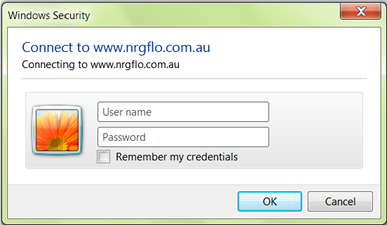
Just click on Cancel and the download should continue.
|
